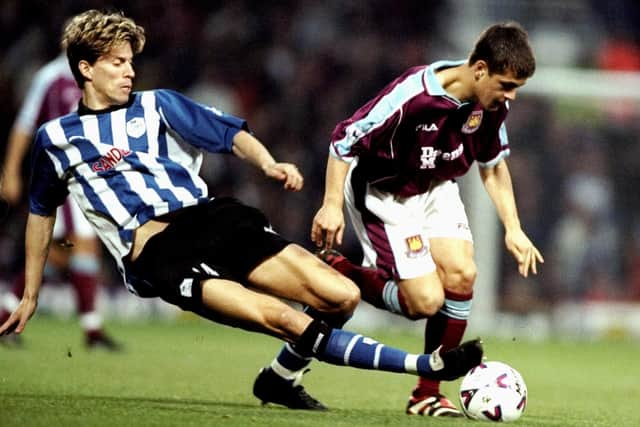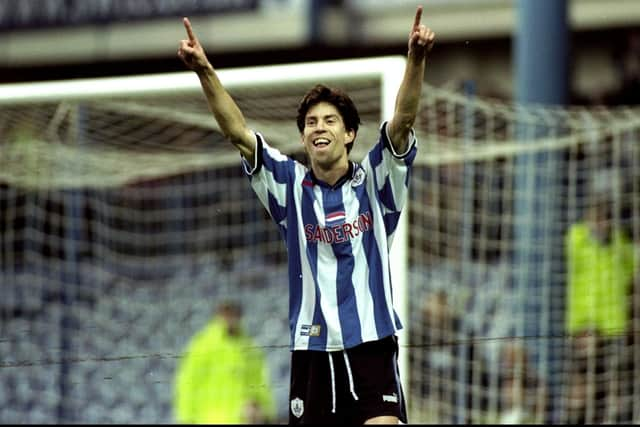Di Canio’s push, Big Ron’s sacking and injury revelations: Petter Rudi on his time at Sheffield Wednesday
and live on Freeview channel 276
“Of course, you should not push a referee, but I don't know whether it was enough of a big thing to get 11 games.”
Speaking exclusively to The Star from his home in Norway, Rudi, now 46, speaks candidly about his “up and down” experience of playing for the Owls in just under four turbulent years in South Yorkshire.
Advertisement
Hide AdAdvertisement
Hide AdBrought in as one of David Pleat’s final transfers as the manager attempted to complete a transition from the halcyon years of the early 90s, Rudi would play under four Owls bosses in those three-and-a-half years, eventually suffering relegation to the second tier 20 years ago this year.
And while he is clear in his opinion that off-field pressures meant that the club was in constant decline in that time, there are two moments in particular that stand out to him as key.
That heart-stopping day against Arsenal was one. Known to many as the most talented players to have played for Wednesday Di Canio, banned for 11 matches for his push on Alcock, was sent home to Italy, didn’t hear from the club for several weeks and was eventually sold to West Ham at a knockdown price.
“If I remember correctly he was not banned from training also, the club banned him,” Rudi said.
Advertisement
Hide AdAdvertisement
Hide Ad“They didn't have to do that. He felt the club was not supporting him. Maybe the 11 game ban was punishment enough.


“If you suspend him from training you make the statement that what he did was not OK, but it made it very difficult for him to come back and play for the club. Maybe it was not handled well enough by the club.
“Paolo was fantastic. He was so involved in training and everything came down to the fact he really wanted us to perform. Football was everything to him.
“He was putting a lot of pressure on all the players and himself, he was such a big personality and sometimes it was too much for him.
Advertisement
Hide AdAdvertisement
Hide Ad“I have not met many more serious players than him for training and other things. Of course in some situations, he crossed the line.”


Another seminal moment, Rudi believes, came some months earlier in the form of the club’s decision not to reward Ron Atkinson a new contract after his efforts in keeping the club up in the 1997/98 season.
Big names such as Gerard Houllier and Walter Smith were touted as Big Ron replacements, but the club went with former player Danny Wilson, a young manager with a bright reputation in football earned through his achievements with Barnsley.
Whoever came in though, Rudi said, would have been a downgrade on the charismatic Atkinson.
Advertisement
Hide AdAdvertisement
Hide Ad“For me, when he came in he had the sort of character that we needed, especially with the fact that every year things were going down and down,” he said.
“I'm very sure that he has continued that it would have been a little bit different, especially in the short term. I don't know exactly why he didn't continue.
“He came in and changed a lot of things, the mentality and the focus. I think if we could have built on that we would have been better off. From there we struggled with too many changes.
“Ron was a nice guy but at the same time if you didn't do your best he could be very, very hard. He had this personality to make people want to play for him and work for him. That's so important in big leagues, you have big players and you need to have that ability.”
Advertisement
Hide AdAdvertisement
Hide AdThose big players came and went during Rudi’s time at S6. Di Canio was followed out of the door by Benito Carbone, Emerson Thome, Niclas Alexandersson and others.
While he recognises the late-90s influx of foreign pros provided a definite shift in dynamic at the previously Brit-heavy Wednesday line-up, he refuses to believe it was a major factor in the events leading up to the club’s fall from the top tier.
“Maybe it wasn't the perfect mix,” he said. “Maybe there were too many changes too quick, but this is easy to say after. If you look at the club's history it was always going down. I don't think it was because of one year, it was a five or ten year period that cost the club.”
Rudi, who now works as an opposition scout for Molde and the Norwegian national team, also revealed the nature of an injury that curtailed his final months as a Wednesday player.
Advertisement
Hide AdAdvertisement
Hide Ad“It was a very difficult season,” he said. “I had quite a serious injury in my achilles but I just played and played and played until I couldn't play.
“I wasn't able to perform well. I wasn't even training in the week, I was just playing and then at the end I was even able to play. It made it even more frustrating I wasn't able to contribute in a proper way.”
Are Rudi’s overriding memories at Sheffield Wednesday positive? “I would say yes and no.
“The timing was not perfect because the club was a bit down. When you look at the size of the club and its supporters it should be a club in the top of the Premier League but it was a difficult time for many reasons.
“I hope one day the club can return to the Premier League. The supporters deserve it.”